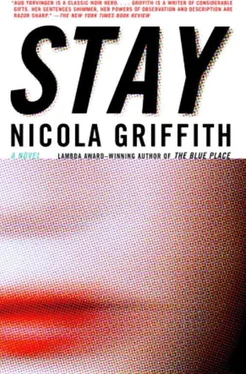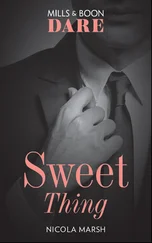The cab pulled into the semicircular driveway in front of the hotel. Big and busy and anonymous. A uniformed doorman opened my door and took my bag, another waved the cab forward to join the line waiting to take some of the perfume- and cologne-drenched passengers queuing behind a red velvet rope. I followed my bag through the lobby to the registration desk. The woman spoke, and my answers must have made sense because I handed her my credit card and she handed me a pen, and then a key card, but it was like watching a silent film. Then I was following the bellman and his gilded bag trolley to the elevators.
The elevators stood near the bar, which was full of burly-voiced conventioneers, several of whom decided at that moment to return to their rooms. When a door tinged and opened, they bulled forward, and although the bellman gestured that he would follow me onto the elevator, I shook my head. The bellman, unlike the usual cheerful kind, merely ducked in assent.
When the next elevator came, he again waited for me to get in first, and pushed the button for the twenty-second floor with a powerful finger. His nails were ragged and chewed, but there were no tattoos on his hands. Curious. His body language—his excessive, almost cringing politeness, his careful button pressing, lack of swagger—was something I associated with time spent in prison, where assertiveness is beaten out of you in a matter of weeks and replaced by a nervous need to please. But there were no jailhouse tattoos.
He knew I was watching him. He didn’t know what it meant. It made him anxious. “Good flight I hope. Well, my name’s Bob, and I’ll be happy to help you with anything you might need during your stay. I’ll just get these bags, this bag, to your room and get you settled. The ice machine is just a few doors down from your room—which faces north, so you should have a view of Central—”
He shut up abruptly. I wondered if my lips were skinning back again. I smiled and forced the bland expression back into place, but he still tried unobtrusively to put the trolley between us. Bad haircut, cheap watch, new shoes, nervous eyes. He hadn’t been doing this long, and it was probably his first steady paying job for a while. What kind of family waited for him when he got home after his shift? Probably divorced, maybe with two kids he was allowed to see every other weekend. The hotel might not even know he had been in trouble with the law. The lack of tattoos meant he’d done his time somewhere soft, and not for too long, so whatever he’d done was probably crime against property rather than person; forged checks, boosting truckloads of cigarettes, something like that. I could do or say almost anything in this elevator and he wouldn’t retaliate: he needed this job, and it would be his word against a guest’s. I tracked the way the muscles in his shoulders moved as he kept his balance in the elevator: not easy, not supple.
The door opened, I stepped off first, he followed cautiously. My room was halfway down a long corridor. I opened it myself, lifted the bag from the trolley, and gave him a ten because it occurred to me that even timid guests probably sensed they could undertip him, and because I felt soiled, having imagined the things I could do to him if I wanted. I knew he had sensed my understanding of his vulnerability, might have bad dreams tonight in his fifth-floor walkup with the bath in the middle of the kitchen. “Thank you,” I said, and shut the door. I opened it again when he was gone, put out the DO NOT DISTURB sign, then locked and chained it.
It took less than a minute to unpack: I had forgotten almost everything. No toiletries, no underwear, not even a comb. Just the clothes I had worn for most of the drive, the clothes I stood up in, three pairs of socks, two books, my phone, and a can of half-frozen concentrated orange juice. How strange.
It was an anonymous room, done in the artificial pinks and grays popular for public spaces five years ago, with two beds. I couldn’t remember the last time I’d been in a hotel room with two beds. The furniture was all fake-mahogany-veneered particleboard, and the window would only open three inches, barely enough to let in the greasy, hydrocarbon air. Room service was open until midnight: another ten minutes. The desk phone felt large and unnatural in my hand. I told the woman who answered that I wanted tomato soup, chicken teriyaki, a bottle of Samuel Adams, and three bottles of Evian. I had to repeat myself because even up on the twenty-second floor and even at night the ululation of sirens and honking of angry drivers on Sixth drowned me out. That done, I stripped off the Eileen Fisher and hung it up.
The only space big enough to lie on the carpet was in front of the dresser. I sat and stretched my tendons one by one. I wondered when Bob got off shift, whether or not he had friends to go for a drink with, or whether he crept home to a microwaved dinner and reruns and infomercials on TV. I stood, began the slow swelling inhalation of an aikido warm-up. Maybe he had a cat who would curl up on his stomach and knead his chest, digging its claws through the cheap cotton and into his skin, reminding him that love hurts. I moved in the blending exercise, soften, step, exhale, turn, slide. There wasn’t room for a kata, or a tai chi form.
There was a mirror above the dresser. I touched my reflection with a fingertip. My reflection felt nothing. That’s what I wanted from the world, to feel nothing. To feel nothing and not be involved, for everything to stay comfortably outside myself and not get in. How did people survive all this knowledge of suffering in the world? How did they carry it around, day after day, and not go mad? And what would I wear tomorrow?
The food came. I didn’t let the man push the table into the room, refused to look at him; I didn’t want to know what he looked like or how he felt or anything about him. I didn’t care, I didn’t want to care. It wasn’t until I shut the door again that I realized I’d answered it in my underwear.
I dreamt of the woman I had found on patrol nine years ago drowned in her tub, eyes turning to glue, the water so still I knew her heart hadn’t beaten in days. Once again I felt the slow, inevitable realization that the air in my lungs was still and stale, that I was dead, too. I woke at three in the morning and thought of how Julia had shaken me fiercely from the same dream six months ago and put her hand on my beating heart and my hand on hers, and told me I was alive, alive.
I had breakfast in my room, then called information. They had no Tammy Foster listed, no Geordie Karp. No Tammy Karp or Geordie Foster. Not in Greenwich Village or anywhere else in Manhattan. It would have been convenient to call ahead and make sure she was there.
At nine in the morning, the concession shops were deserted but none of them sold underwear. Guests might forget toothbrushes, they might forget a pen, their vitamins, a comb, but they didn’t usually forget underwear. I had remembered the perfect change of clothes, down to jewelry, brought credit card and money and socks and shoes, but had not thought of a coat or underpants. We only recognize we have an autopilot when it goes horribly wrong.
Even in dirty clothes it was a pleasant walk to Saks in the kind of sunlight New York specializes in at the beginning of autumn: too warm in the sun, too cold in the shade without a coat. There was never quite enough space on the sidewalk to stride, and after I bought underwear and toiletries I walked back along Fifth all the way to East Fifty-seventh, just so that I could swing my arms. St. Patrick’s Cathedral, St. Thomas’s Church, the Fifth Avenue Church: a similar concentration of churches per square mile as the poor Baptist South, though probably not as well attended. Central Park beckoned briefly, but I resolutely turned left and kept walking. Move, don’t think.
Читать дальше












